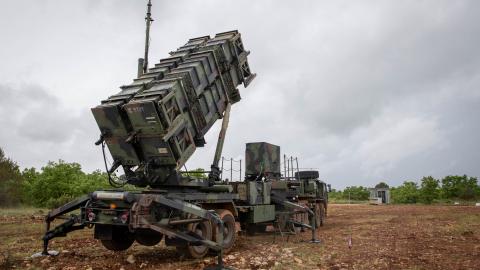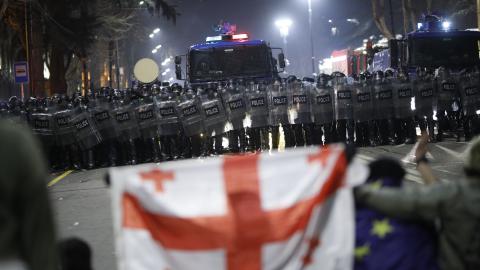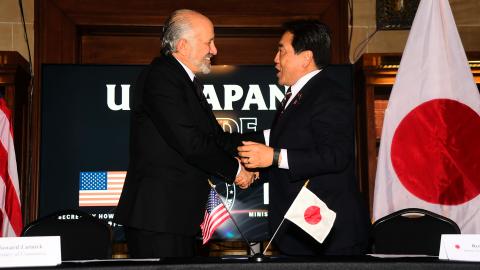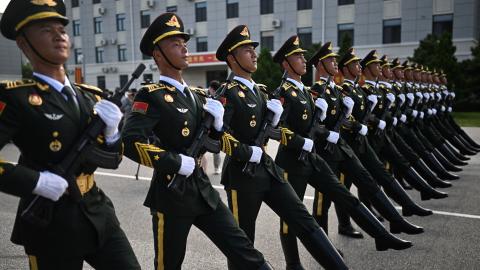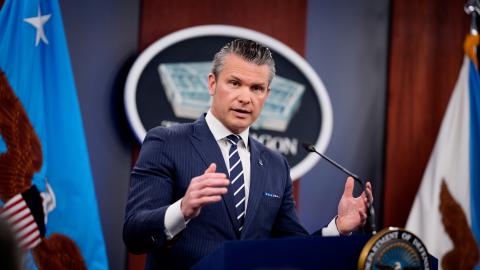Good afternoon, and thanks to the Potomac Institute for organizing this event. Rather than just recapitulate things I've said elsewhere about Iran's program and the threats it presents both to the United States and to the nonproliferation regime, I'd like to change the focus in order to talk about a subject that seems to be hovering as a fuzzy shape just outside of our collective view: the prospect of a "covert" war of sabotage and shadowy, largely "deniable" violence against Iran and its nuclear weapons program.
By its nature, the topic is one that serving government officials are unable to discuss publicly, except to issue just the sort of routine denials that one would expect to hear whether or not they are actually true. If you believe some media accounts, however, such a conflict may already be both underway and accelerating, even as the Iranian nuclear crisis seems to be getting closer to some kind of unpredictable endgame. Recognizing that the topic is potentially very significant, therefore and not myself being in government at present I'd like to walk through three common arguments and assumptions many seem to make about such a covert war, to see how well they stand up to analysis. Before we go down that road, however, it's worth a quick review of why this is a subject of such speculation today.
I. A Covert War?
The United States has believed for some time initially based exclusively upon classified evidence, but more recently buttressed by extensive public findings by the International Atomic Energy Agency (IAEA) that Iran has been engaged in a nuclear weapons development program. To my knowledge, this was first publicly addressed in January 1993, just as the George H.W. Bush Administration left office. In a report to Congress at that time, U.S. officials assessed that Iran had demonstrated a continuing interest in nuclear weapons, and was in the early stages of developing a nuclear weapons program, with an emphasis on developing centrifuge technology. Similar conclusions were repeated in reports by the Clinton Administration throughout the 1990s. By 2004 after the revelations in August 2002 about the centrifuge plant at Natanz, and amidst the IAEA's early investigations the United States began openly calling Iran's nuclear work a violation of the NPT's Articles II and III, a conclusion written into an official compliance report in 2005.
By some accounts, at least, the United States may also have done more than just point fingers. It has been claimed in the press, for instance, that some kind of secret U.S. campaign against Iran's nuclear weapons program that is, an effort that went beyond merely ordinary "denial" efforts such as the interdiction of weapons of mass destruction (WMD)-related supplies and the imposition of at least national sanctions was underway at least as early at 2000, when the Central Intelligence Agency (CIA) is said to have used a cut-out to feed a deliberately faulty nuclear weapons design into Iran's covert nuclear acquisition pipeline. Perhaps in connection with what U.S. officials have coyly described as their ongoing effort to seek out "opportunities for intervention" in Iran's nuclear weapons work, and to do "everything we can to make sure that we complicate matters for them," Washington supposedly engaged in a covert sabotage effort in the early 2000s.
The effort was reportedly refined and accelerated after U.S. experts had a chance to examine uranium enrichment gas centrifuges removed from Libya in 2004. According to a British newspaper, in fact, President George W. Bush signed a highly-classified covert action "finding" in 2007, authorizing an elaborate secret campaign to sabotage the Iranian nuclear weapons effort. Among other things, this campaign is said by some journalists to have included slipping defective parts into the Iranian supply chain.
If any of this is true, it may have included some really intriguing efforts. Last year, for instance, produced remarkable revelations about what that acceleration may perhaps have produced such as the "StuxNet" computer worm, which I have called cyberwar's first "precision-guided munition." An apparently enormously complex and sophisticated bit of coding that seems to have been supported by a good bit of very successful espionage, StuxNet passively infected thousands of computer networks worldwide but is believed only to have actually done anything to harm two particular facilities: the steam turbine at Iran's Bushehr nuclear reactor and the centrifuge enrichment cascades at Natanz. Interestingly, it seems to have been designed not only to sabotage these facilities, but to do so without alerting Iranian officials to the fact that their operations were being impeded by a cyber attack. This sabotage was apparently intended to go on mysteriously and indefinitely, potentially stalling the program's progress for years. (Unfortunately, it was discovered and publicized elsewhere, by a computer security company, in June 2010. )
Some press accounts have described StuxNet as a joint U.S.-Israeli effort, which is certainly not implausible, but this is as yet still merely a speculative and unconfirmed conclusion. Whomever is responsible, however, it has been claimed that despite the worm's lamentably premature revelation, Iran's centrifuge program does seem to have suffered a rash of unexplained problems, at least for a while.
In the least year or two, media accounts of at least possible additional sabotage efforts by the United States, Israel, and/or perhaps other Western allies seem to have picked up, with reports emerging of mysterious killings and explosions in Iran, seemingly targeted at WMD-related scientists and facilities. Iran has openly accused the United States and Israel for orchestrating the killings, albeit apparently without any actual evidence, though it either denies reports of explosions or dismisses them as innocent accidents of purely Iranian provenance. The truth, of course, is largely unknowable to outsiders at this time, but the press coverage is certainly fascinatingly suggestive.
In a quick search yesterday, the earliest report of such an event I could find dates to January 2010, when a senior physics expert at Tehran university rumored to have some connection to the Iranian weapons program was killed by a motorcycle bomb. In November of that year, another nuclear scientist was killed, and a second wounded, by motorcyclists who attached small bombs to the windscreens of their cars while the scientists were on their way to work in Tehran. (The wounded man was apparently a specialist in isotope separation and a member of the Iranian Revolutionary Guard Corps [IRGC] an interesting juxtaposition, to be sure while the dead scientists was reportedly a physicist. Both were said to have been on the central committee of Iran's nuclear association.) These attacks continued in 2011, with another killing in July, when a nuclear scientist in Tehran was shot dead by passing motorcyclist.
Just last month, moreover, an IRGC general a senior leader in Iran's ballistic missile program was killed in a huge explosion at a missile facility southwest of Tehran. (The blast apparently all but destroyed the entire base, and may constitute a huge setback to Iran's solid-fuel ballistic missile effort.) Just last week, mysterious blasts were also reported to have been heard in or near the city of Esfahan, where Iran runs its uranium conversion program, apparently partly concealed in a maze of underground tunnels.
Is all of this part of an accelerating secret campaign against Iran and its WMD program? Your guess is as good as mine, though people increasingly seem to think so.
II. Thinking About Covert War
But that's why the question of how to evaluate the idea of covert war matters: it may perhaps already be underway. So let's now test a series of commonly-heard assertions about and usually against the idea of covert war against Iran.
A. Idea #1: "Covert War is Illegal"
From a certain perspective, legality is irrelevant. In the view of some, the whole point of covert action is do things that aren't allowed under normal rules. Recall, for instance, the view reportedly expressed by then-Vice President Al Gore in a 1993 discussion of whether the CIA should snatch a wanted terrorist into its custody overseas: "Of course it's a violation of international law, that's why it's a covert action. The guy is a terrorist. Go grab his ass."
I would suggest, however, that this is an unhelpfully simple reading. For one, at least in the U.S. system, the main point of covert action (a.k.a. "CA") is not necessarily to do what is illegal but rather to do whatever it is in secret. The definition of a covert action for which a so-called presidential "finding" is needed under the National Security Act of 1947, as amended is an activity designed to influence political, economic, or military events abroad in a way in which U.S. involvement will not be apparent, or at least not be acknowledged. Legality, then, is technically a separate question, for one might still choose to do perfectly legal things as covert action in order to take advantage of their consequent "deniability." (For purposes of U.S. law, moreover, a "CA finding" may actually make some things lawful that would otherwise have been forbidden.) The congruence of CA work with international law is naturally a different issue, but it's a mistake to elide the three distinct issues of secrecy, conformity to U.S. law, and legality under international law.
One way to look at the legality of anti-Iranian counterproliferation CA is to remember that both the United States and Israel seem to feel that overt strikes against Iran's nuclear weapons program remain an "option" that is "on the table," even if perhaps undesirable. They do not articulate it in these terms, but I presume this entails a concomitant belief in the legality of such strikes, most likely as an act of self-defense. Both countries, in fact, have previously moved by force to forestall what were believed to be threats from an emergent nuclear weapons program in a hostile and dangerous Middle Eastern rogue state: Israel in 1982 and 2007 against nuclear reactor projects in Iraq and Syria, and the United States in 2003 against Iraq. (The United States also came very close to mounting air strikes against North Korea in 1994, ultimately being dissuaded from doing so not on account of any concern about legality but simply because the Clinton Administration thought it had reached a deal with Pyongyang that would alleviate the threat.)
One can presumably read these past decisions, along with present-day policy positions, as endorsement of the idea that, at least sometimes, attacking a potential adversary's WMD program is a legitimate exercise of preemptive or preventative self-defense. (Indeed, given the paucity of other examples of states that have confronted such a proliferation challenge and had any feasible option of prophylactic attack, one might make a case for such a doctrine, or perhaps a reinterpretation of older standards, as an emergent norm of customary international law on the grounds that most, or all, similarly-situated states feel themselves free to respond with prophylactic military gusto.) Lawyers can no doubt argue over this, but it seems clear that the United States regards air strikes as being "legally available."
If this is so, however, it also stands to reason that the "lesser-included" category of a covert campaign should also be considered lawful. Indeed, one could perhaps make a legal (and moral) case for covert attack as a preferable option. To put it in traditional legal terms, once one crosses the threshold of conceding jus ad bello that is, once you accept the legality of resorting to force in the first place, which anyone who reserves a "military option" presumably does the time-tested standards of jus in bello (law governing the conduct of war) could make a covert campaign seem not just permissible but indeed rather attractive.
As with techniques of targeted killing more generally which are now, of course, a favorite tactic of both U.S. and Israeli forces in those countries' ongoing struggles against terrorists a case could be made that covert sabotage or direct action missions offer their military "payoff" at less humanitarian cost than overt conflict. (The geopolitical cost might be less too, since the notionally "deniable" nature of covert attacks might help constrain, though not eliminate, the opponent's choice of retaliatory options. By contrast, there isn't much that is more politically inflammatory than openly attacking someone.) Just as blowing up an al Qa'ida leader or Hamas commander with a Hellfire missile fired from a Predator drone or an Apache helicopter can accomplish an important mission with less loss of innocent life than more traditional "kinetic" means involving artillery salvos or aerial bombing runs, so too might computer worms, component sabotage, and predatory motorcyclists be seen as a way to impede Iran's nuclear program that is in some regards preferable to aerial bombs and cruise missiles. Such shadow-war techniques may or may not, in the end, actually work, of course and one could surely do much more damage to the Iranian program with bombs and missiles but this would be merely a policy complaint. If there exists any legitimate "military option" at all, it is hard to fault a covert campaign on legal grounds alone.
But is there a feasible jus ad bello argument for any sort of lawful use of force? The Israeli self-defense case for preventative or preemptive action against an Iranian nuclear weapons program is certainly stronger than the American one, and for obvious reasons: Israel is not just closer to the threat and subject to even more bellicose rumblings out of Tehran, but also perilously small. Not for nothing do commentators frequently speak of Israel confronting genuinely "existential" issues when contemplating the prospect of a radical Iranian theocracy armed with nuclear weaponry. Yet the American case is far from negligible in its own right, nor is it hard to imagine the two countries finding common cause. (Jus ad bello does not require that all belligerents face threats of the same magnitude in order to have just cause for war. If one country has a legitimate reason to resort to force in self-defense, the law surely does not forbid it having allies.)
International lawyers are, of course, divided on the topic, but since the terrorist attacks of September 2001, a vigorous case has been made for reinterpreting the permissible bounds of "anticipatory self-defense" for the WMD era. One should not have to wait, some argue, until a potential adversary's nuclear-tipped missiles are just about to be fired, for that is not to be law-abiding but rather to flirt with suicide. How "imminent" the prospect of attack must be to trigger self-defense, the argument goes, is something that must be understood to vary with the circumstances.
In U.S. legal circles, it is common to see the lawfulness of self-defense discussed in the context of the Caroline affair, in connection with which it was the position of the U.S. government that self-defense permits the anticipatory use of force only where the threat is "instant, overwhelming, and leav[es] no choice of means, and no moment for deliberation." Caroline involved a cross-border raid in 1837 to seize a steamboat being used by U.S.-based rebels against British rule in Canada, in the aftermath of which U.S. Secretary of State Daniel Webster advanced this phrasing about "instant and overwhelming" threat, apparently hoping that the British would find themselves unable to meet that stringent criterion. The British riposte, however, was to accept the basic criterion but to liken the facts in question to circumstances in which in the words of a later chronicler "a man standing on grounds where you [ordinarily] have no legal rights to chase him presents himself with a weapon long enough to reach you." In such circumstances, London contended, self-defense permitted the putative victim some leeway.
Interestingly, though they agreed about the applicable legal standard, the two powers never quite reached accord how to operationalize it in the face of different fact patterns. Their exchange of correspondence, however and this very disagreement over how precisely imminent the threat must be, or what it means in the real world to be so give some support to the view that the answer is not a rigid, axiomatic one, but instead will vary with circumstances. And that, in turn, is presumably good news for those who support flexibility in invoking "self-defense" today in circumstances where one's security (or very existence) would be imperiled by a potential adversary's development of weapons capable of horrific effects over long distances in a shockingly short period of time.
These are not new legal disputes, of course. They have been contested legal terrain at least since the George W. Bush Administration's 2002 National Security Strategy, which declared it both important and proper, in this "new world" of WMD and terrorism-related dangers, to "act against such emerging threats before they are fully formed." To my eye, there is more than enough to such arguments both analytically and in terms of major-power precedent in support of some concept of prophylactic counter-WMD warfare to keep the debate very much alive today.
But U.S. officials may also have in mind an additional potential rationale for the use of force against Iran. Tehran is now believed not only to have encouraged and supported guerrillas who have attacked U.S. forces in Iraq and Afghanistan, but also to have maintained a connection to the al Qa'ida terrorist network for years. Some second-tier leaders from that group, for instance, apparently fled from Afghanistan to Iran as the Taliban fell, where they were initially detained but from which they were subsequently sent to Pakistan to resume their fight. Links between Iran and al Qa'ida were reported in the press as early as 2003, and were mentioned also in the report of the 9/11 Commission.
Last summer, the Obama Administration also acknowledged an Iranian connection, with the Treasury Department announcing sanctions against an Iran-based terrorist network that seems to have been serving as an al Qa'ida pipeline for personnel and funding in support of its anti-American jihad. This is said to have been quite deliberate on Iran's part. One senior Obama Administration official described this link as creating "a key funding facilitation network for Al Qaeda operating through Iranian territory with the knowledge and at least the acquiescence of Iranian authorities." In fact, in the words of the U.S. Undersecretary of the Treasury for Terrorism and Financial Intelligence, Iran actually made a "secret deal with Al Qaeda allowing it to funnel funds and operatives through its territory."
These are portentous conclusions indeed, for the United States clearly feels itself already to have ample legal authority to use force against al Qa'ida, as well as its affiliates and its supporters. This authority invokes the principle of self-defense, as well as the U.S. Congress' Authorization for the Use of Military Force (AUMF) of September 2001 a pronouncement that authorizes the president to
"use all necessary and appropriate force against those nations, organizations, or persons he determines planned, authorized, committed, or aided the terrorist attacks that occurred on September 11, 2001, or harbored such organizations or persons in order to prevent any future acts of international terrorism against the United States by such nations, organizations or persons."
To date, this has been the legal basis for the use of lethal force against terrorists and their supporters including the al-Qa'ida-supporting Taliban government of Afghanistan in ways both overt and covert, and in no small number of countries. (Nor is the AUMF interpreted as authorizing violence only against those who themselves were involved in the 9/11 attacks: it seems well established that al-Qa'ida and those who support it may be engaged on an ongoing basis.) I have yet to hear the argument made publicly, but it is possible that Washington envisions Iran's alleged support for al-Qa'ida as constituting a distinct and complementary source of legal authority for the "military option" against Iran as well.
My point here is not to make a legal case justifying any kind of campaign against Iran. I do think it's useful, however, both to point out the general contours of what we might yet come to hear from government officials and to highlight the fact that there are arguments that could be made. There seems to be more "flexibility" in these legal joints that is, more opportunity for the exercise of policymaker discretion in choosing a course of action than many observers like to admit.
B. Idea #2: "Covert War Would Provoke a Bloodbath"
Another idea one sometimes hears articulated is that a "secret war" against Iran would be simply be a grave policy mistake. This usually revolves around variations on arguments made against an overt attack. Iran, it is said, is an accomplished sponsor of international terrorism, and would be sure to respond in kind, and to our disadvantage.
This argument certainly contains a good deal of truth. Iran certainly is capable of fighting a covert war and indeed, such a battlespace is one in which the playing field would be a good deal more "level" between Tehran and a hypothetical coalition of foreign states than if things came to a blows openly with conventional military tools. All the same, this particular "unwisdom" argument may overmake its point.
For one, Iran has in some sense already been in a covert war against the United States for decades, from helping Hezbollah slaughter U.S. Marines with a Beirut truck bomb in 1983, to helping arrange the bombing of the U.S. Air Force barracks at Khobar Towers in 1996, and to supporting militants in Iraq and Afghanistan in more recent years. Rightly or wrongly, moreover, Iran assumes itself already to be in a violent covert struggle over its nuclear program, publicly attributing the scientist killings to Israel and the United States. To judge by Tehran's apparent willingness to engage in what the Obama Administration says was a plot to kill the Saudi ambassador and bomb the Israeli embassy in Washington, Iran does not seem to see there being any "covert war" taboo left to be broken: for Tehran, the game is already on.
Could Tehran make things worse? No doubt. But we shouldn't assume, sitting here in Washington, that we face a simple choice between remaining in a state of peace and jumping suddenly into an entirely new situation of escalating conflict. Finding ourselves in a de facto covert war whether we like it or not, the case against actually doing some fighting is weaker than might otherwise be the case. In fact, under the circumstances, it is not hard to imagine officials in the United States or in Israel finding a covert campaign particularly attractive, particularly if the most obvious alternatives are the notably unpalatable options of either waging an overt war or learning to "live" with the enormous threats and problems presented by a nuclear-armed Iran. Through this prism, a shadow campaign of sabotage and killing might seem alluring.
C. Idea #3: "Covert War Wouldn't Stop the Iranian Program"
I have also heard it argued that counter-proliferation CA would be very unlikely to stop Iran's march toward a nuclear weapons capability. This is probably true: I would not disagree that the occasional mysterious explosion at an IRGC base and the periodic gruesome demise of a nuclear scientist is unlikely to "stop" or "erase" Iran's nuclear progress. (I doubt, in fact, that even a full-scale campaign of air strikes would do that trick either in Iran or in any relatively sophisticated and wealthy country found to be engaged in a fairly well-developed and advanced nuclear effort.)
That argument, however, somewhat misses the point, for the immediate point either of air strikes or of a covert war would presumably be not to achieve "cessation," per se, but to impose delays, drive up costs, and otherwise to constrain program effectiveness. Policymakers presumably need some kind of follow-up plan regarding what they hope to try to accomplish during any resulting delay, but one cannot argue that delay is an intrinsically unworthy goal. Delaying tactics must be assessed with an eye to what might happen in the time they purchase. (A delay-inducing sabotage campaign might fit well, for instance, with a regime-change strategy, especially if the latter were deemed unlikely to bear fruit before Iran could weaponize on its current trajectory.)
And there's another important point that might be worth making here. I've argued repeatedly for some time, we make a serious mistake if we approach the Iranian nuclear crisis solely as an Iranian nuclear crisis. It is also a systemic crisis for the nonproliferation regime as a whole, which we very much need to survive this instance of the international community's transparent inability to enforce NPT rules. If Washington is serious about nonproliferation and about trying to ensure there is a nonproliferation regime in the future we must approach Iran with these broader implications in mind.
This could have important implications. Washington might come to conclude, for instance, that it has an interest in a protracted covert struggle against Iran even if Tehran succeeds in weaponization. Such a shadow war might play a role in helping contain and constrain Iran as part of a "coercive containment" strategy, of course, but it might also be felt to have value beyond Iran by demonstrating the price that any country may have to pay if it violates its NPT obligations by developing nuclear weapons. Even if we fail to prevent an "Iranian bomb," in other words, there might be felt good reason for covert war against Iran and its nuclear program for essentially the same reason Voltaire saw behind the British Admiralty's decision to execute Admiral John Byng in 1757: pour encourager les autres.
Future Western policymakers might conclude that we could best preserve and vindicate the nonproliferation regime by ensuring that the perceived meta-narrative of Iran is not one of a plucky underdog that thwarted a superpower, but rather one of a foolish dictatorship's decision to trade short-term tactical "success" in weaponization for a long-term future of strategic "failure": isolation and contempt, unrelenting pressure, impoverishment and weakness, thwarted regional ambitions, coupled with escalating shadowy violence, endemic sabotage, and regime-change pressures. If this perspective were to prevail, a rationale for covert campaigns against Iran might exist whether or not it actually slows or "stops" the Iranian nuclear program, and even after weaponization.
III. Conclusion
Judging from the IAEA's most recent report on Iran's nuclear effort, the Iranian nuclear crises seems farther than ever from what we in Washington would consider a "successful" resolution. Iran already has almost 5,000 kilograms of low-enriched uranium (LEU), and has been busily working since early last year to produce highly-enriched uranium (HEU) at the 20 percent level a point at which the vast majority of the work needed to reach weapons grade has already been done, making a final "sprint" fairly quick and easy, even with a small concealed centrifuge cascade. (Tehran now has some 74 kilograms of HEU.) Under Yukiya Amano's leadership, the IAEA is now both admitting its inspectors' longstanding worries about Iranian weaponization and publishing the considerable amount of information it has acquired on the subject. Obama Administration officials still claim we have plenty of time to turn things around, but to everyone else in the world it looks increasingly like some kind of endgame is rapidly approaching.
It's thus not surprising to see the issue of a "military option" returning to the political foreground in both the United States and Israel, along with fierce debates about the merits and demerits of such a choice. In light of this debate, while it is not publicly known whether any such thing is already underway, it would not be surprising were officials to be increasingly interested in exploring a possible "third way" between acquiescence and open attack. My point is not to advocate such a course here, but merely to point out that it would not be as obviously unlawful, nor perhaps as unwise, as many commentators would have it. Whether or not a covert war is already being waged, therefore, we should perhaps expect to hear more and more discussion of the topic.
